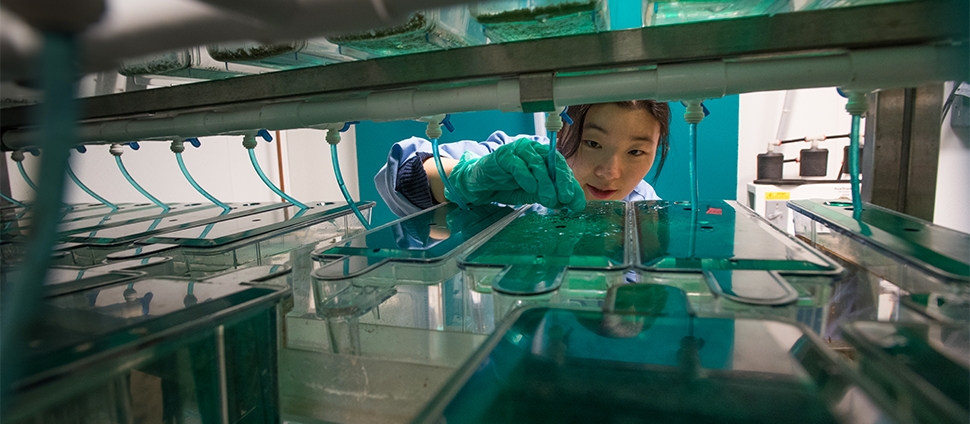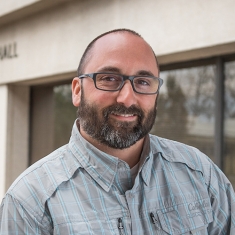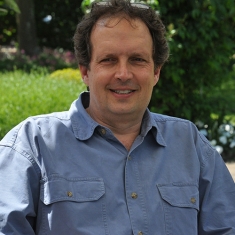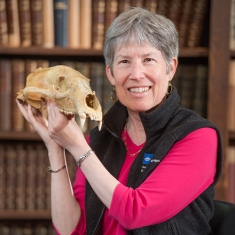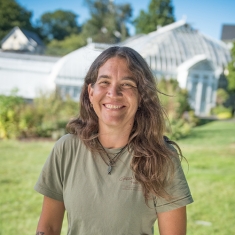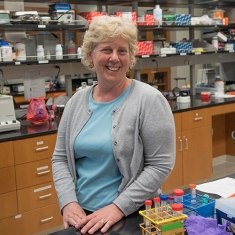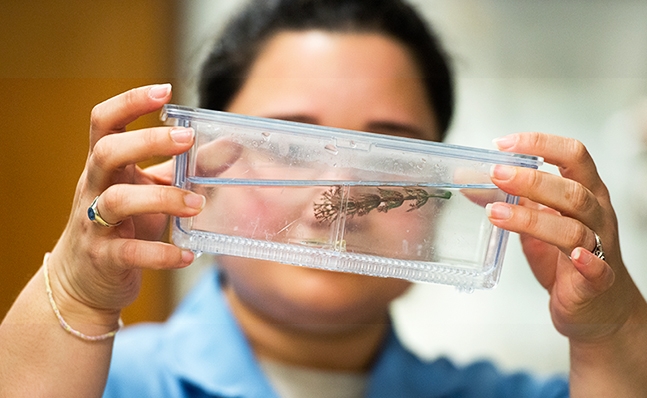The Department of Biological Sciences treats the life sciences in all their breadth and diversity, including the study of molecules, cells, whole organisms, ecosystems, plants, animals and microorganisms. The requirements for the major in the biological sciences provide both a solid foundation in biology and opportunities to pursue special interests.
The major embraces three broad core areas: cells, physiology and development; genetics, molecular biology and evolution; and biodiversity, ecology and conservation. All majors are strongly encouraged to pursue collaborative research with any of the department’s faculty members who work in areas as diverse as bacterial pathogenesis, ecological impacts of invasive marine organisms, ecology of coral reefs, regulation of photosynthesis, ciliate evolution, muscle biochemistry, mammalian reproductive ecology and the molecular biology of human parasites.
The biological sciences form the foundation of a number of academic disciplines at Smith, including biology, biochemistry, neuroscience, landscape studies and environmental science and policy. The major in biological sciences itself spans organisms from bacteria through plants and animals, levels of organization from molecules and cells through ecosystems, and modern research methods in both the laboratory and the field.
Students in biological sciences master fundamental concepts in introductory courses with associated laboratories or fieldwork. In those courses, students conduct research projects, an emphasis on research that recurs in the upper-level courses that follow. As they choose those courses, they select a track to focus their learning in specific areas (cells, physiology and development; genetics, evolution and molecular biology; biodiversity, ecology and conservation) or instead choose a broad integrative approach that can include an option to prepare to teach at the secondary-school level.
Learning Objectives for the Biological Sciences
Content-Related
- Broad knowledge of the field of biology and its foundational concepts
- Deeper knowledge, fluency and ability to creatively engage in a subdiscipline of biology
- Use of interdisciplinary fields to support an enhanced understanding of the life sciences
Skills-Related
- Critical thinking and rigorous evaluation of primary scientific research
- Evaluation and understanding of one’s own learning process
- Demonstrated ability using the scientific method, empirical approaches and the generation of original knowledge
- Competency in employing standard quantitative and statistical approaches to organize, analyze and interpret scientific data
- Effective communication of scientific information to academic and general audiences
Ethical Conduct and Civic Engagement
- An understanding of science and research ethical considerations
- Building identity and confidence within the field of the life sciences
- Understanding and participation in public and stakeholder concerns related to science policy with evidence based approaches
With a rich array of courses and access to extensive research resources, students in biological sciences graduate with the knowledge and experience they need to begin careers in research, academia, the health professions, the biotech and pharmaceutical industries, conservation, wildlife management, secondary education and many other endeavors.
A quick guide to the Biology Major (for LAA advisors and first-year students) can be found here.
The major in biological sciences includes a set of five fundamental courses (biodiversity ecology and conservation, cell and molecular biology, genetics or evolution, chemistry, and statistics) plus courses within one of the five tracks listed below. Biological sciences majors can select courses that prepare them for professional training in medical, dental and veterinary schools; for graduate programs in the various biological disciplines; for high school teaching; and for employment in research labs, pharmaceutical companies and government agencies.
Track 1: Integrative Biology
Track 2: Cells, Physiology, and Development
Track 3: Genetics, Evolution, and Molecular Biosciences
Track 4: Biodiversity, Ecology and Conservation
Track 5: Biology and Education
Specific details about which courses are included for each track can be found below in the Course Offerings tab.
Advising
Students should choose their advisers, according to their interests, from the department faculty.
Prospective majors should consult with biology faculty in choosing their courses.
Study Abroad Adviser: Each student should consult their major adviser for any necessary study abroad information and signatures.
Advanced Placement Credit
Students receiving advanced placement on their Smith College transcript for biology (e.g., AP [4 or 5 score], International Baccalaureate, A Levels) may substitute either BIO 130 or BIO132 with a 200- or 300-level course in the same subfield of biology. In other words, a 200 or 300 level course in ecology, biodiversity, or conservation can substitute for BIO 130; whereas a course in molecules, cells, or systems (physiology) can substitute for BIO 132. Regardless, students are NOT exempt from the BIO 131 and 133 laboratory methods courses. Please consult with either Prof. Barresi (mbarresi@smith.edu) or Prof. Hayssen (vhayssen@smith.edu) if you think you are eligible for advanced placement.
The requirements for the minor in biological sciences comprise six courses chosen in consultation with an adviser. These courses usually include at least one core course and must include one 300-level course. At least one laboratory course is required; one-credit or two-credit laboratories do not count as separate courses toward the minimum of six required courses. No more than one course designed primarily for non-majors may be included. One course from another department or program may be included provided that course is related to a student’s particular interest in biology and is chosen in consultation with her adviser.
Advising
Members of the department also serve as advisers for the minor. Students should choose their advisers, according to their interests, from the department faculty.
Director: Nathan Derr
430d Thesis
8 credits
Full-year course; offered each year
432d Thesis
12 credits
Full-year course; offered each year
Eligibility
- GPA of 3.3 for courses in the major taken (including courses in the major taken at other institutions)
- A thesis proposal (500 to 1000 words) must be approved by the thesis adviser and the members of the department prior to the college deadlines for submission of honors applications.
Requirements
- Requirements for the major
- 8 or 12 thesis credits in the senior year, involving an individual investigation, an oral presentation and a written thesis.
Thesis
The thesis is graded by two to three readers: the thesis adviser, a faculty member in biology and optionally a third faculty member outside the department.
Evaluation
The final honors determination is based on:
- Overall GPA (twenty percent)*
- Final oral presentation (twenty percent)
- Quality of the thesis (sixty percent)
*The thesis course (430D or 432D) receives a grade which is calculated in the overall GPA.
Smith College Course Search
Smith’s online course search includes course listings (description, instructor and offered terms), department data, information on majors and minors, honors programs and cross-listed and interdepartmental courses. A search function allows you to find courses by course number, department, keywords in the title, term offered, number of credits, fields of knowledge and professor.
Five College Course Guide
The Five College Consortium increases your choices. Four liberal arts colleges—Smith, Amherst, Hampshire and Mount Holyoke—along with the University of Massachusetts, offer joint courses of study as well as certificate programs in interdisciplinary fields. Courses are available at no extra cost to Smith students.
Summer research (SURF) at any point in your Smith trajectory is an outstanding way to enhance your training, to help you explore your own preferences and passions, and introduces you to a network of students and investigators that you will come to rely on as you build your career. Participating in a research project makes you part of the vast and exciting enterprise of knowledge creation. You should be part of that enterprise, and all of us benefit from having you be part of it.
Students who want to participate in summer biology research at Smith should begin this process in late fall or very early in the spring semester. Start by checking out the list of available projects and make an appointment to talk to the appropriate biology faculty member(s) whose projects interest you. This is a critical step: you will not be eligible to apply for a SURF position until you have spoken to the faculty member in charge of the project. In your application, you will have to designate the lab that you wish to be considered for, but you will also have the opportunity to indicate other labs/projects that caught your eye.
Following your discussion with the biology faculty member, you need to fill out an application as soon as possible so that we may inform you of our decision as early in the spring as we can. This makes it possible for you to make wise decisions about your summer and plan accordingly.
Please email bioasst@smith.edu for details, access to the list of available summer projects, the application form, and further information about the process.
Life Sciences Lunchbag Schedule
Thursdays, 12:15–1 pm in McConnell 103 unless otherwise noted
Lunchbags are a weekly gathering of students and faculty of the Biological Sciences Department. All members of the Smith Community are welcome. Pizza will be provided for the first 35 attendees. Please bring your own beverage. Don’t want pizza? Students can pick up a Grab-and-go lunch from the dining hall of their choice beforehand. For more information, contact adonahue@smith.edu.
9/21/23 | Virtual Lab Safety Seminar
Interested in a research project or independent study? In order to work in a lab with biological materials and/or chemicals, Smith College requires all students to attend a lab safety seminar once during their Smith career. Even if you're not planning to start working in a lab quite yet, we recommend you attend.
This is a remote Zoom session and participants must sign in by 12:20 to receive credit for attending. Meeting will be LOCKED OUT at 12:20 due to the critical safety information presented. Email adonahue@smith.edu for the registration link.
9/28/23 | Biology Peer Mentoring Kickoff
Mentors and mentees will meet to learn the expectations for the peer mentoring program.
10/5/23 | Listening Session: Biological Sciences Department
This student-only event will provide an opportunity for reflection and feedback about the biology department.
10/12/23 | How to Find a Research Position in a Smith BIO Lab
Not a member of a Smith research lab yet? Join us to learn about research opportunities!
10/19/23 | Biological Sciences Presentation of the Major & Minor
Hear from student liaisons about the major/minor requirements, laboratory research opportunities, and study abroad possibilities and meet with faculty.
10/26/23 | Biological Sciences Advising Session & How to Build a Course Schedule
Ask questions of BIO faculty and student liaisons. This session does not replace the one-on-one meeting with your adviser.
11/2/23 | No Lunchbag—Cromwell Day
11/9/23 | Student Research Highlights (Honors)
11/16/23 | Student Research Highlights (Honors)
11/30/23 | Student Research Highlights (Honors)
12/7/23 | Student Research Highlights (Honors)
12/14/23 | Student Research Highlights (Honors)
Life Sciences Colloquia Presentations are part of the Fall 2023 Mary Elizabeth Dickason King M.D. Annual Lecture Series in the Life Sciences in Memory of Professor Howard Parshley.
Thursdays at 4:30 p.m. in McConnell 103
Light snacks will be served in the McConnell Foyer at 4:15 pm
9/21 Kathy Iovine, Lehigh University
“Deciphering how the Gap Junction Protein Connexin43 Regulates Skeletal Patterning in the Zebrafish Fin”
9/28 Cagney Coomer, Dartmouth College
“It Takes Two to Tango: Transgenic Tools for Transsynaptic Tracing”
10/19 Brandon Ogbunu, Yale University
“Insights into Epidemics from Analyses of Genome Evolution”
10/26 Nipam Patel, University of Chicago and Marine Biological Laboratory
“How to Make Structural Color in the Butterfly Wing”
Emeriti
Margaret Anderson
Professor Emerita of Biological Sciences
Richard T. Briggs
Professor Emeritus of Biological Sciences
Michael Marcotrigiano
Professor Emeritus
Robert B. Merritt
Professor Emeritus of Biological Sciences
Richard F. Olivo
Professor Emeritus of Biological Sciences
Stephen G. Tilley
Myra A. Sampson Professor Emeritus of Biological Sciences
Student Liaisons
-
Eyananda Ahmed (2024)
-
Valeria Bastardo Brito (2025)
-
Cass Creager (2025)
-
Julian Hernandez (2024)
-
Hannah Jaffe (2025J)
-
Daun Lee (2024)
-
Mary Ann Martinez Molina (AC, 2025J)
-
Ida Sy (2025)
Master’s in Biological Sciences
The Department of Biological Sciences maintains an active graduate program leading to the master of science degree in biological sciences, emphasizing independent research supported by advanced course work.
Contact
Fax: 413-585-3786
Email: bioasst@smith.edu
Administrative Assistant: Elizabeth Iola Sylvan
Current Chair: David Smith, biochair@smith.edu

